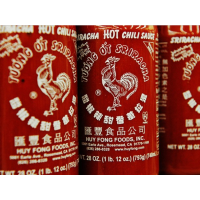Judge Orders Partial Closure of Sriracha Plant while Hunt for Odors Begins

Now that the Sriracha hot sauce plant in the Los Angeles area has finished processing chiles for its world famous condiment, a judge has deemed it safe to partially shut it down and determine if it is truly the cause of noxious odors that are making its neighbors nauseous.
Los Angeles County Superior Court Judge Robert O’Brien on Tuesday agreed with the city of Irwindale that owner Huy Fong Foods should shut down any suspect portion of the plant that might conceivably be causing the problems and immediately search for ways to mitigate them.
The judge initially denied the city’s request for a temporary injunction last month to shut the place down, calling it “rather edgy.” Judge O’Brien said the city seemed to have dallied in making its appeal to the court and then wanted “a very radical order on 24-hour notice.”
The plant owner pleaded for at least enough time to finish its 3-month period of harvesting and processing chiles for the hot sauce, arguing in court that the company would suffer severe financial harm if the production cycle were interrupted. Devotees of what some consider the hottest hot sauce on the market expressed dismay at a potential shortage of the product or escalation of its price. The Atlantic predicted, somewhat facetiously, that a Sriracha black market was inevitable.
Although it’s hard to find a news story about the plant that isn’t filled with jokey cracks about the owner feeling the heat, it was no joke to members of the community who complained of headaches, inflamed asthma, burning eyes, sore throats and heartburn. Neighbor Ruby Sanchez told the Associated Press, “It's like having a plate of chili peppers shoved right in your face.”
The judge said in his ruling that he did not find “credible evidence” the odor posed a health threat, but he did say the city was likely to prevail if it pursued a declaration that the plant was a public nuisance.
The 2-year-old, 650,000-square-foot factory was built with the help of city redevelopment funds and processes 100 million pounds of peppers a year in producing the hot sauce and two other Asian food sauces. During chiles season, around 40 trucks a day drop off millions of jalapeno peppers that are crushed and mixed with other spices along a conveyer belt.
When neighbors complained about the smell of peppers and garlic, the company installed filters at the plant. After that failed to relieve residents, the city suggested that a $600,000 advanced filtration system be added, but the company said “no.”
Company officials hinted that if Irwindale residents and the city continued to give the plant grief, they might shut it down and take their business elsewhere. For now, indications are the plant will continue to function on a limited basis, bottling its products, while the scope of the judge’s order, which is expected to be officially released today, plays out.
If production of Sriracha, popularly known as Rooster Sauce, slows or is curtailed it will no doubt be sadly missed. As one of its many fans, waxing poetic, said, “Sriracha, you are a delicious blessing flavored with the incandescent glow of a thousand dying suns.”
Amen, and pass the Maalox.
–Ken Broder
To Learn More:
Sriracha Plant Must Cease Operations that Cause Odors, Judge Rules (by Frank Shyong, Los Angeles Times)
Pollution Suit Puts Chill on Popular Hot Sauce Sriracha (by Erica A. Phillips, Wall Street Journal)
Judge Denies City Lawsuit over Sriracha Hot Sauce Factory that Has Nearby Residents Burning (by Ken Broder, AllGov California)
- Top Stories
- Controversies
- Where is the Money Going?
- California and the Nation
- Appointments and Resignations
- Unusual News
- Latest News
- California Forbids U.S. Immigration Agents from Pretending to be Police
- California Lawmakers Urged to Strip “Self-Dealing” Tax Board of Its Duties
- Big Oil’s Grip on California
- Santa Cruz Police See Homeland Security Betrayal in Use of Gang Roundup as Cover for Immigration Raid
- Oil Companies Face Deadline to Stop Polluting California Groundwater





